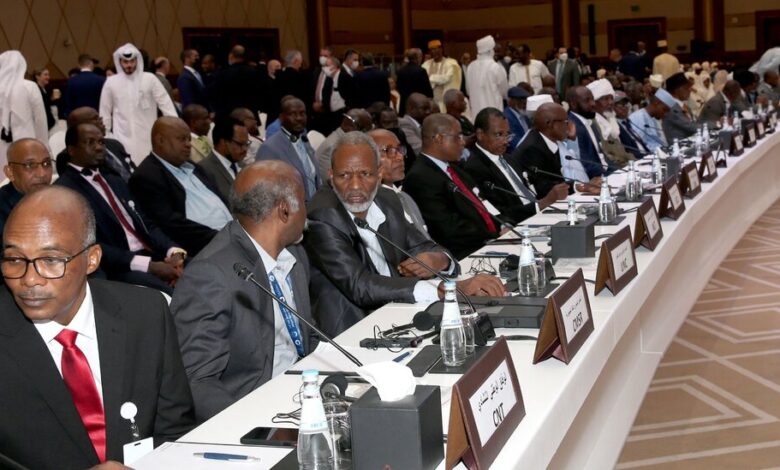Chad’s Military Junta and Rebels Sign a Deal, but a Main Player Is Missing

DAKAR, Senegal — Chad’s military government and more than 40 rebel groups signed a cease-fire agreement on Monday in Qatar, paving the way for reconciliation talks later this month as the Central African nation seeks a way out of a troubled political transition.
But the signing of the agreement, after five months of negotiations, was overshadowed by the absence of Chad’s most powerful armed group, which refused to to join in the accord, making any prospects for a return to stability all the more uncertain.
After Chad’s longtime autocratic ruler, Idriss Déby, died while fighting against rebels in April last year, his son Gen. Mahamat Idriss Déby seized power and vowed to lead the country through an 18-month transition period.
With less than two months left in that transition period, Mr. Déby’s military government and rebel groups have been negotiating in Doha, Qatar, what comes next. On Monday after nearly five months of talks, they agreed to hold national reconciliation talks later this month in Chad’s capital, N’Djamena, which would then pave the way to democratic elections.
But the absence among the signatories of one of Chad’s main rebel groups, the Front for Change and Concord in Chad (F.A.C.T., by its French acronym), threw the outcome of the coming talks into question. It was while visiting troops fighting against the F.A.C.T. that Mr. Déby was killed last year, according to the Chadian military authorities.
On Sunday, the group’s spokesman said the accord didn’t respect key requests such as the immediate release of prisoners and parity between the government and opposition groups during the coming reconciliation talks.
Thus the agreement may bring some temporary stability, but any lasting peace is unlikely, said Remadji Hoinathy, a Chadian political analyst based in N’Djamena.
“Some protagonists have long understood that the only way to have a frank discussion in Chad is to go through armed rebellion,” said Mr. Hoinathy, an analyst with the Institute for Security Studies.
Even as a broad mix of political parties, rebel groups and the military government are set to convene in N’Djamena this month, Mr. Hoinathy said, “Those who didn’t sign the accord may as well invite themselves to the conversation — but through weapons.”
Mamadou Djimtebaye, a Chadian political journalist, said that scenario could have been true years ago, but is not anymore. “That’s an old framework — people won’t let it happen,” he said. “They want elections, and both the government and F.A.C.T. have understood that.”
Issa Ahmat, the spokesman for F.A.C.T., said any resolutions from the reconciliation talks would likely be biased in favor of the government. But he said that violence wasn’t on the table. “We haven’t closed the door to dialogue,” Mr. Ahmat said in a telephone interview.
The presence of myriad groups in Doha — more than 50, with nearly 10 of them rejecting the accord — highlighted the key role they have played in Chad since the country’s independence from France in 1960. The country’s history has been characterized by military dictatorship and repeated attempts to seize power by such groups, often operating from neighboring Libya or Sudan.
Besides the cease-fire, the agreement signed on Monday includes a disarmament program; amnesty and the safe return of rebels outside Chad; the end of recruitment by rebel groups; and the release of prisoners on both sides.
The Union of Resistance Forces, which tried to oust the elder Mr. Déby in 2019 by sending a column of fighters in 50 pickup trucks from Libya — only to be beaten back by French airstrikes — signed the agreement. But another powerful group, the Military Command Council for the Salvation of the Republic, rejected the pledge.
Now, as the transition period is likely to exceed its 18-month term, Chadians have been increasingly frustrated with the junta.
In May, supporters of the country’s main political opposition group, Wakit Tama, were arrested following protests against the military government. They also denounced France’s presence in the country and its support for the military leaders, echoing a rising anti-French sentiment in former French colonies.
France has long considered Chad, a nation of 17 million, a strategic partner in the Sahel region. France’s counterterrorism operation, Operation Barkhane, has been headquartered in N’Djamena since its launch in 2014.
But critics have pointed to a double standard by France. In Mali, it has been unflinching with military leaders who seized power in a coup last year, yet it has been more accommodating toward Chad’s government, even though Mr. Déby’s takeover following his father’s death was also unconstitutional.
Human rights organizations have also criticized Mr. Déby for a broad crackdown on peaceful protests and the arrests of hundreds of members and supporters of the opposition.
“Chad’s significant military commitments in the fight against terror have meant that the international community has felt comfortable to turn a blind eye to the serious human rights violations in country,” Human Right Watch’s director for Central Africa, Lewis Mudge, wrote in April.
Chad’s troubled history has been marked by several peace agreements similar to those signed on Monday, which Mr. Hoinathy said had often brought limited results.
Jérôme Tubiana, an independent expert on Chad, said “Key groups are missing, but the government’s plan may not have been to have all those groups as signatories.” He continued, “Instead, it may have tried to avoid negotiations between the government on one side, and all the groups together on the other.”
“If the government had a divide-and-rule strategy, then it won.”
